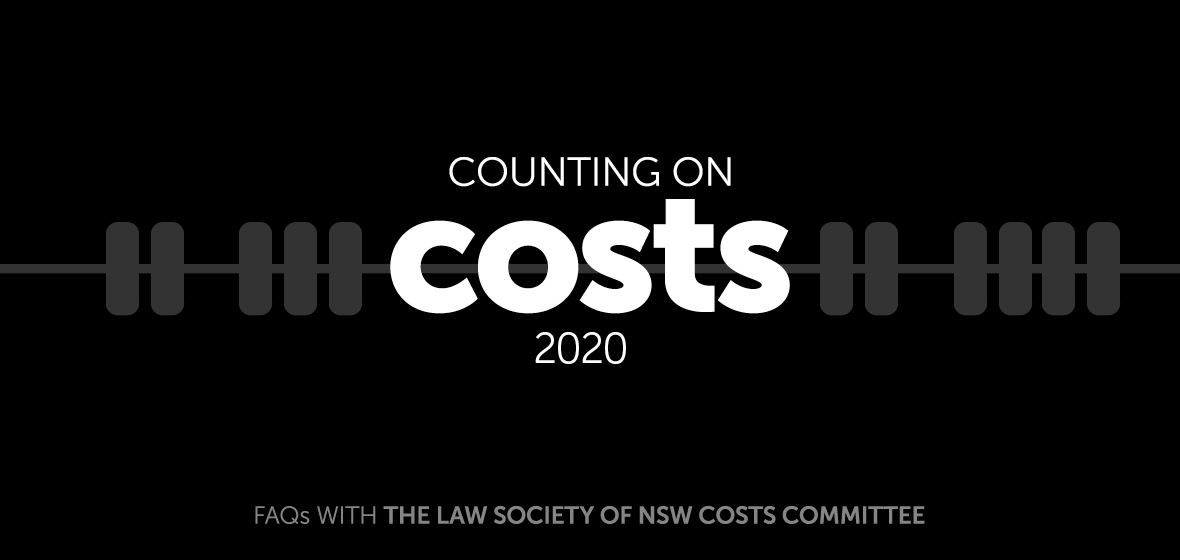Q: One of my clients obtained a costs order against another party in court proceedings. The court did not order interest on costs – can I claim it anyway?
LSJ Issue 73, December 2020
A: Under sub-sections 101(4) and (5) of the Civil Procedure Act 2005 (NSW), in any proceedings commenced after 24 November 2015 an order for one party to pay another party’s costs of court proceedings is deemed to include an order for interest on costs from the date of judgment at the “prescribed rate”, unless the court orders otherwise.
The “prescribed rate” is set out in rule 36.7 of the Uniform Civil Procedure Rules 2005 (NSW), which provides that the prescribed rate in respect of either the first or second half of a calendar year is “6 per cent above the cash rate last published by the Reserve Bank of Australia” before that half year commenced. The reference to the “cash rate” is a reference to the Reserve Bank’s cash rate target, which in the early 1990s was as high as 17 per cent, but in more recent times has fallen to 0.25 per cent.
Accordingly, even where the court has not expressly ordered interest on costs, in proceedings commenced after 25 November 2015 a party benefiting from a costs order will ordinarily (unless otherwise ordered) be entitled to claim interest on costs from the date of judgment at the relevant cash rate, increased by 6 per cent.
If the cash rate has changed during the period in respect of which interest is claimed, it will be necessary to claim different rates for different periods.
Q: What are my obligations when Counsel sends through a fee agreement?
LSJ Issue 72, November 2020
A: Ordinarily, the position between solicitor and client is that Counsel is a subcontractor of the solicitor, and his or her fees are passed on to the client. Consequently (and in any event by virtue of section 175 of the Legal Profession Uniform Law), Counsel’s fee agreement should always be passed on to the client. But is that enough?
Solicitors are also under fiduciary duties to act in the best interests of their clients. Unless clients are highly sophisticated (for instance, general counsel in an institutional client), they may have no idea whether Counsel’s fees are reasonable or not, and may effectively rely upon their solicitor to protect them from unfair or unreasonable conditions.
Counsel’s fee agreements, as well as expert witness engagement terms and other third-party fee agreements may contain terms and conditions that go beyond what is commercially reasonable, such as unreasonable cancellation terms or recurring “administration” fees.
Before passing an agreement on to a commercially unsophisticated client for approval, a solicitor should ordinarily review it, warn the client about any unreasonable terms, attempt (if so instructed) to negotiate more favourable terms – and also warn the client that fees that are found to be unreasonable will not be recoverable on a party/party costs assessment.
Q: I gave my clients a discount and they’re still getting my costs assessed. Can I reverse the discount?
LSJ Issue 71, October 2020
A: Ordinarily, absent express written agreement to the contrary (for example, in a costs agreement), practitioners do not have an automatic right to withdraw an existing bill of costs and substitute new bills of costs for the purpose of assessment. The legal position is complex (a useful overview may be found in Gorczynski v Beilby [2005] NSWSC 884, at paragraph 52 and onwards), but the starting point is that a solicitor has no automatic right to reverse, on assessment, a discount previously given.
There are also specific provisions of the legislation which must be considered. For instance, if a lump sum bill is replaced by an itemised bill for a higher amount, rule 74 of the Legal Professional Uniform General Rules 2015 (NSW) says that the higher amount may be recovered only if, at the time the lump sum bill was given, the law practice made an “appropriately worded” disclosure in writing to the client indicating that the total amount of costs claimed in any itemised bill may exceed those claimed in the lump sum bill, and the higher costs are determined to be payable by a costs assessor or the Office of the Legal Services Commissioner.
Q: What if a client complains about costs I’m trying to recover?
LSJ Issue 70, September 2020
A: Under Chapter 5 of the Legal Profession Uniform Law (NSW) (LPUL), a client may be entitled to complain to the Legal Services Commissioner about a “costs dispute”, as defined in section 269 of the LPUL.
If such a complaint is made after the practitioner or the client has already applied for assessment of the costs concerned, the assessment will ordinarily be stayed until the complaint has been determined, by virtue of section 197 of the LPUL.
By virtue of the same section, if there is not already a costs assessment underway, any fresh application for assessment made before resolution of the complaint will automatically be stayed.
However, this automatic stay does not necessarily mean the practitioner is able to relax and do nothing about a pending assessment or deadline. A complaint to the Legal Services Commissioner will not pause or extend:
- the time to respond to a request for objections/response by the Manager, Costs Assessment, in an existing assessment (which cannot be extended, even by the Manager); or
- the 12-month period for practitioners to apply for assessment of their own costs under section 198(3) of the LPUL (as discussed in the April 2020 edition of LSJ).
- Accordingly, practitioners need to ensure they comply with these deadlines even if the balance of the costs assessment process has been stayed.
Q: Costs rules – what if I get it wrong?
LSJ Issue 68, July 2020
A: Practitioners who comply with costs rules benefit from favourable presumptions – for example, the rule that costs properly disclosed in a costs agreement are prima facie considered reasonable (Legal Profession Uniform Law (NSW), s172(4)). However, failures to comply with costs rules can have severe consequences, as can overcharging.
First and foremost, either circumstance is capable of constituting unsatisfactory professional conduct or professional misconduct (Legal Profession Uniform Law (NSW), ss178(1)(d), 298(a), (d)). Further, and irrespective of the conduct consequences (which apply whether or not there is a dispute), practitioners who have overcharged or failed to make proper disclosure will suffer a number of automatic adverse consequences in any dispute about costs:
- Failure to comply with disclosure requirements cancels the usual presumption that a costs agreement is prima facie evidence of the reasonableness of the costs disclosed in the agreement (Legal Profession Uniform Law (NSW), s172(4)). The costs agreement is automatically deemed void, and costs recovery proceedings are unable to be commenced until costs have been assessed (Legal Profession Uniform Law (NSW), s178(1)).
- Moreover, in any subsequent solicitor/client costs assessment, if the Costs Assessor concludes that there has been insufficient disclosure, or if costs are reduced by 15 per cent or more, there is a presumption that the law practice must pay the costs of the assessment (Legal Profession Uniform Law (NSW), s204).
It is important to keep on top of costs compliance. The Law Society’s Legal Costs Unit is here to help members and can be contacted with any questions on (02) 9926 0116 or [email protected].
Q: I’m representing myself – can I claim costs?
LSJ Issue 67, June 2020
A: Ordinarily, self-represented litigants are not entitled to an order for their costs of court proceedings. However, prior to September 2019, it had been thought that legal practitioners who represented themselves were exempt from this rule. This supposed exemption was known as the “Chorley exception”, after an 1884 case (London Scottish Benefit Society v Chorley (1884) 13 QBD 872).In September 2019, the High Court of Australia found that the Chorley exception is not a part of Australian law (Bell Lawyers Pty Ltd v Pentelow [2019] HCA 29).
Consequently, barristers and solicitors representing themselves in Australian courts will ordinarily not be entitled to claim costs, because they are not exempt from the ordinary rule that no order for costs should be made in favour of self-represented litigants.
Q: My client has not paid my fees. Can I lodge a caveat over his/her home?
LSJ Issue 66, May 2020
A: It can be unlawful, and can potentially constitute a conduct issue, for a practitioner to lodge a caveat over a client’s property to secure fees.
The first point to note is that it is unlawful for anybody to lodge a caveat unless a valid “caveatable interest” exists – a circumstance which must be verified by statutory declaration. Solicitors who lodge caveats improperly (whether for themselves or others) can face disciplinary consequences (see for example Law Society of NSW v Manolakos [2018] NSWCATOD 54, Law Society of NSW v Young [2010] NSWADT 264).
It is not a complete solution for practitioners to include a “charging clause” in their costs agreements, under which clients agree to charge their property as security for payment of costs. Although this is a common method used by commercial suppliers to obtain security, solicitors are not ordinary suppliers. By virtue of their statutory and ethical duties, they are in a unique position.
The inclusion of a charging clause in a client costs agreement has been found to give rise to an “obvious” conflict of interest, and to exceed the statutory right to “take reasonable security” for legal costs. The solicitor’s fiduciary duties also loom large, even if the fiduciary relationship has not commenced at the time the arrangement is proposed.
Long story short, solicitors must approach the question of security for legal costs with enormous caution. As the authorities show, the cost of getting it wrong is not only invalid security, but also adverse costs and disciplinary action.
Q: My client is refusing to pay my fees. What do I do?
LSJ Issue 65, April 2020
A: Fee disputes can be very stressful and time-consuming, particularly for sole practitioners and practitioners in smaller firms. Internal matters like debtor recovery are often the last matters a busy practitioner will address – however, in costs disputes, time is of the essence.
If it becomes apparent that you are going to need to take formal action to recover your costs, it is important to consider early on whether you will need to have your costs assessed prior to commencing recovery action.
Pursuant to section 178(1) of the Legal Profession Uniform Law (LPUL), if a law practice has not complied strictly with all costs disclosure requirements–including the requirement to update costs estimates–a client is not required to pay any costs at all until they have been assessed, or any costs dispute has been determined by the designated local regulatory authority (which, in New South Wales, is the Office of the Legal Services Commissioner).
So why is time of the essence? Due to section 198(3) of the LPUL, a law practice only has 12 months to apply for assessment of its own costs.
If this opportunity is not taken, and costs disclosure obligations have not been complied with, the combination of sections 178 and 198 may result in the costs becoming permanently irrecoverable.




